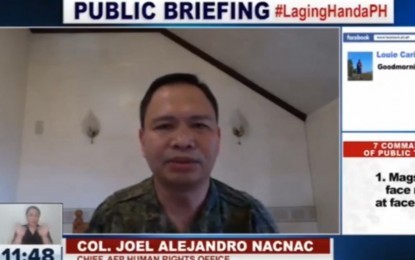
Armed Forces of the Philippines Human Rights Office head Col. Joel Alejandro Nacnac (Screenshot)
MANILA – The Department of National Defense has acted within the "ambit of its mandate" when it abrogated the University of the Philippines (UP)-DND Accord of 1989 as the police power of the state cannot be bargained through any form of contract, according to Armed Forces of the Philippines Human Rights Office (AFPHRO) head, Col. Joel Alejandro Nacnac, on Thursday.
"The UP-DND Accord of 1989 was abrogated by the DND Secretary for the simple reason that the operations of the AFP and PNP (Philippine National Police) as protector of the people, should not be hampered by a one-sided obsolete contract,” Nacnac said in a statement.
Nacnac said the accord has given special treatment to UP for more than 30 years and in one way or another, prevented State forces from protecting the students from being recruited by the Communist Party of the Philippines-New People's Army-National Democratic Front (CPP-NPA-NDF).
"As such, human rights principles were upheld due to the abrogation. The AFP has no intention of putting military camps inside any of the UP campuses nor to suppress activist groups. Never that the AFP intervened in the holding of any non-violent protest activities against the government," he added.
He said the Commission on Human Rights (CHR) should not be alarmed by the withdrawal of the DND from the agreement, adding that the AFP is not a suppressor of civil or political rights but a protector of human rights.
He added that freedom of expression and the right to peaceful assembly are always respected by the AFP since it is provided under Article 19 and 20 of the Universal Declaration of Human Rights (UDHR) and also embodied under the Philippine Bill of Rights.
As a protector of people’s rights, the AFP has a solemn duty to respect it and the eyes of the AFPHRO are always open to see to it that these rights of the people are respected by the military, Nacnac said.
On academic freedom, he said Article 26 of the UDHR provides for the people’s right to education.
"That is why in all State universities like UP, free tuition fee is provided by the government to the so-called Scholars of the State. These young scholars should be studying in a conducive and communist-free environment," Nacnac said.
The academic freedom, he said, should not have been made as an issue in the abrogation because it has been jurisprudentially settled in the case of Cudia vs. Superintendent of the PMA (Philippine Military Academy) Feb. 24, 2015 and reiterated by the Supreme Court in the case of Raymond Son, et.al vs UST (the University of Sto. Tomas), April 18, 2018, “that academic freedom encompasses the freedom of the school to determine for itself on academic grounds: 1. Who may teach; 2. What may be taught; 3. How it shall be taught; and 4. Who may be admitted to study.”
“With this, the abrogation of the UP-DND Accord does not curtail such freedom as UP will still be able to execute these rights even without such agreement and there is no human rights violation committed against the students and faculty members of UP," he added.
As part of the police power of the State, he said the government has a duty to protect the youth from being deceived, used, and conscripted by the CPP-NPA.
Nacnac added that the AFP does not diminish nor undermine the rights guaranteed to the Filipino people.
"We assure the UP administration and the citizenry that the AFP shall always respect human rights and uphold the rule of law," he added. (PNA)
